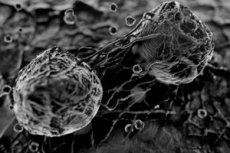New publications
A broad pool of genes involved in age-related blood cell mutations has been identified
Last reviewed: 02.07.2025

All iLive content is medically reviewed or fact checked to ensure as much factual accuracy as possible.
We have strict sourcing guidelines and only link to reputable media sites, academic research institutions and, whenever possible, medically peer reviewed studies. Note that the numbers in parentheses ([1], [2], etc.) are clickable links to these studies.
If you feel that any of our content is inaccurate, out-of-date, or otherwise questionable, please select it and press Ctrl + Enter.

Scientists have discovered 17 additional genes that cause abnormal growth of mutated blood cells as we age. The findings, published in the journal Nature Genetics, provide a more complete picture of the genetic factors behind clonal hematopoiesis, a process associated with ageing that increases the risk of developing blood cancers.
Researchers from the Wellcome Sanger Institute, Calico Life Sciences in California and the University of Cambridge analysed sequencing data from more than 200,000 people in the UK Biobank cohort. They looked for genes that showed signals of "positive selection", in which mutations allow populations of mutant cells to expand significantly over time.
The 17 new genes identified were associated with the same diseases as previously known mutations associated with clonal hematopoiesis, highlighting their clinical significance in driving the accumulation of mutant blood cell clones.
The discovery of these previously unrecognized genetic drivers opens new avenues to study the molecular mechanisms underlying clonal hematopoiesis and its role in disease, which could lead to new approaches to improving healthy aging. It could also lead to more accurate genetic tests to help identify risks for blood cancers and cardiovascular disease.
As we age, our cells accumulate random genetic mutations. Some of these mutations may provide a competitive growth advantage, allowing mutant cells to multiply and outcompete healthy cells, forming large "clones," or populations of identical mutant cells. When this positive selection occurs in blood stem cells, it is called clonal hematopoiesis. This process is associated with blood cancers, cardiovascular disease, and other age-related diseases.
Although previous studies have identified approximately 70 genes associated with clonal hematopoiesis, most of the newly observed cases are not associated with mutations in any of these known driver genes, suggesting that additional genetic factors are involved.
The researchers set out to map the signature patterns of positive selection in the ageing blood system using exome sequencing data from more than 200,000 individuals in the UK Biobank cohort. They identified 17 genes that drive the accumulation of mutant cell clones in the blood, in addition to known driver genes.
Inclusion of mutations in these newly identified genes increased the prevalence of clonal hematopoiesis by 18% in the UK Biobank cohort, highlighting their impact on ageing.
Dr Michael Spencer Chapman, co-author of the study from the Sanger Institute, said: "While existing genetic tests have been useful for early detection of disease, our findings show there is scope for improvement. By including these 17 additional genes associated with clonal hematopoiesis, we may be able to improve genetic testing methods to better identify risks associated with blood cancers and cardiovascular disease."
Nick Bernstein, a co-author of the study, formerly of Calico Life Sciences in California and now at NewLimit, said: "With our new genes, we now have a more complete picture to develop strategies to slow or reverse the abnormal growth of mutant blood cells to promote healthy ageing. These genes appear to influence inflammation and immunity, important factors in conditions such as heart disease and stroke. While interventions based on this research are still a long way off, it opens up possibilities for future treatments for a wide range of diseases."
Dr Jyoti Nangalia, senior author of the study from the Sanger Institute and the Wellcome-MRC Cambridge Stem Cell Institute, said: "Our study identifies a much broader set of genes that contribute to the accumulation of mutant cell lineages with age, but this is just the beginning. Larger studies across different populations are needed to identify the remaining driver genes and provide further insight into the process and links to disease."
